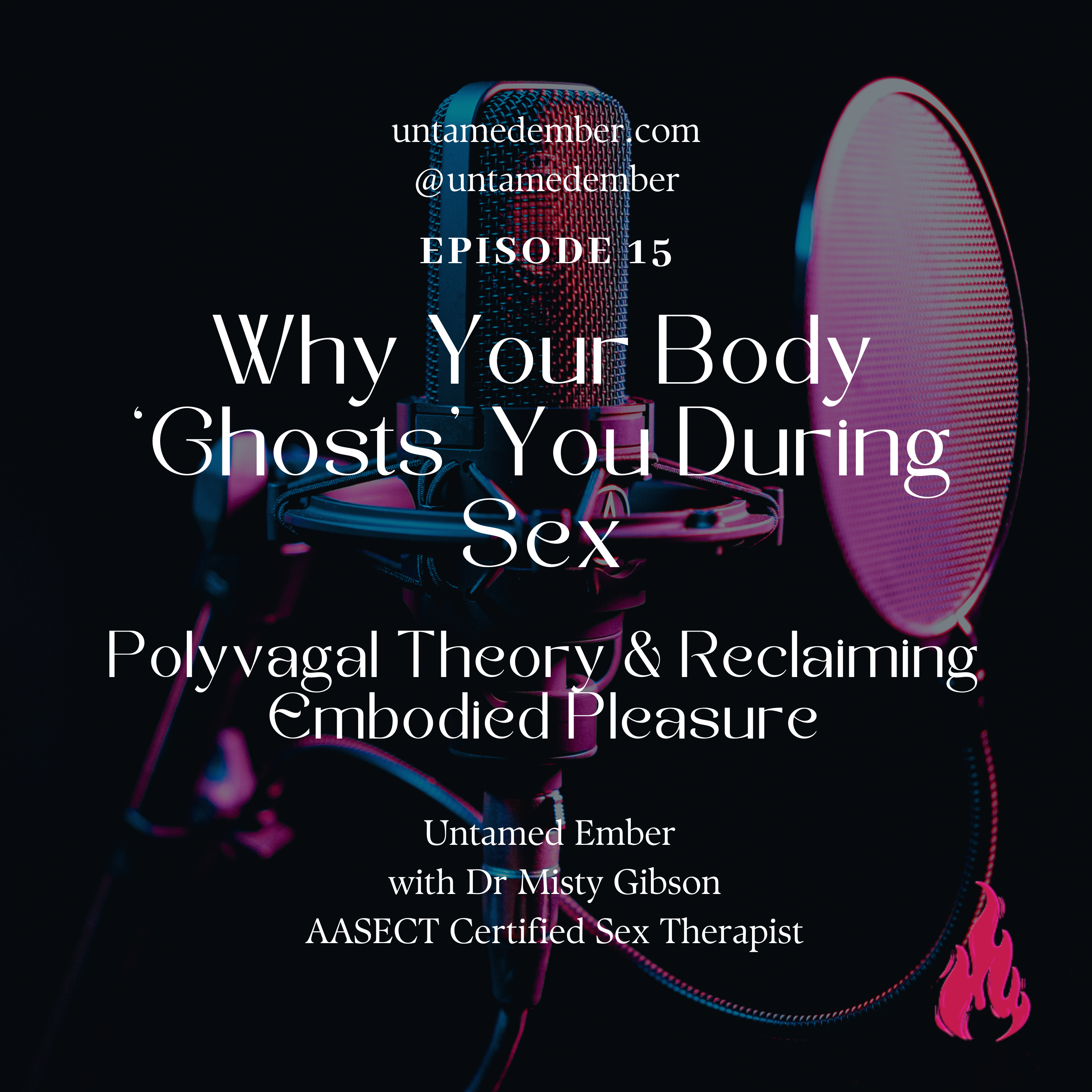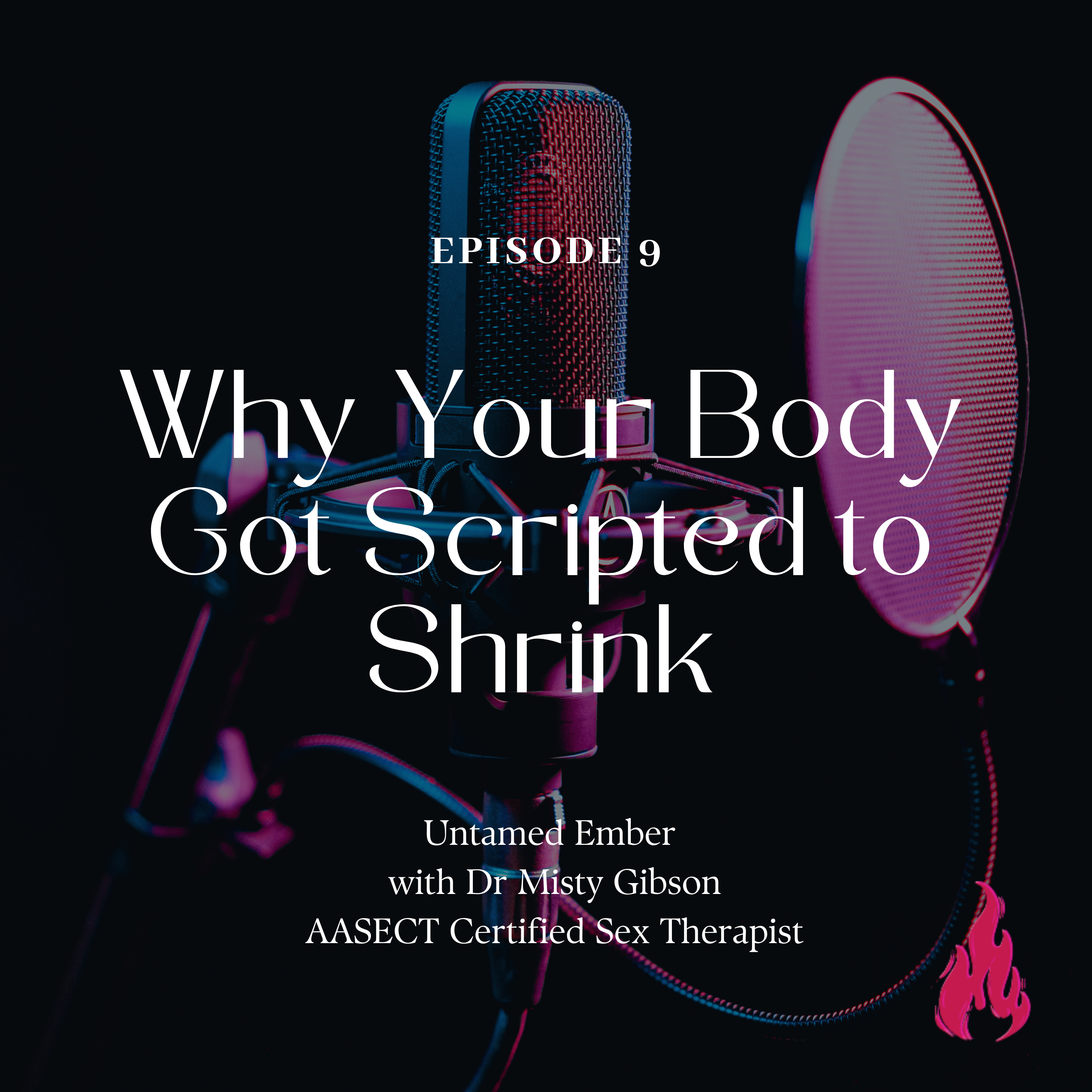Episode Transcript
[00:00:02] Hey there, rebels and Reclamation warriors. This is Dr. Misty with Untamed Ember. And today we're diving into something that happens in bedrooms everywhere, but almost nobody talks about. You know that moment, the one where you're physically present during sex. Your body is there, going through the motions, but you aren't really there at all.
[00:00:21] It's like someone hit a switch and suddenly you're floating somewhere near the ceiling, watching yourself like some bored cosmic spectator. Your mouth might be saying, yes. Your body might even be performing pleasure, but inside, you've gone completely offline. Maybe you're counting ceiling fan rotations. Maybe you're mentally reorganizing your sock drawer. Maybe you're just gone. A ghost in your own sexual experience.
[00:00:46] And the wildest part, this happens. Even though you wanted this encounter, you consented. You were excited about it. This wasn't unwanted touch. This was something you chose, something you desired.
[00:00:59] And yet your body said, actually, we're gonna check out now. Have fun up there staring at the ceiling. If you've ever experienced this profound disconnect, this frustrating, confusing moment where your mind and your body seem to be operating in different dimensions, I want you to know something critical.
[00:01:19] You are not broken. You are not defective. Your sexuality isn't permanently damaged.
[00:01:24] What's happening in these moments is a completely normal nervous system response to perceived threat. Not threat that you're consciously aware of, but threat your body remembers even when your mind has moved way past it. Today, we're going to decode this experience through the lens of polyvagal theory, which is basically the trauma nerd's secret decoder ring for understanding why your body keeps ghosting you during intimacy.
[00:01:50] We're going to learn why your nervous system sometimes hits the emergency eject button precisely when you're trying to connect. And most importantly, we're going to talk about how to expand your capacity for staying present during pleasure. Because here's the truth. Your body wasn't designed to sabotage you. It's trying to protect you.
[00:02:12] And once you understand the language it's speaking, you can begin a whole new kind of conversation, one that leads back to embodied pleasure as your fundamental birthright, with trust and safety in your body.
[00:02:26] So if you've ever felt betrayed by your own body during sex, stay with me. This one is for you.
[00:02:35] So I want you to know that you are part of a massive community of people whose bodies sometimes hit the pause button on pleasure. And that's exactly what we're unraveling today.
[00:02:45] In this episode, we're going to break down three Key things.
[00:02:49] First, we're going to dive into polyvagal theory. But don't worry, I am not going to drone on with technical jargon. We're talking practical neuroscience that explains why your body sometimes overrides your desires during intimacy.
[00:03:03] Second, we'll explore how to recognize when you're leaving your window of tolerance during sex those subtle and not so subtle signs, and that you're sliding into freeze flight or fawn responses. And finally, the juicy part. Actually some somatic tools you can use to expand your capacity for pleasure. Not generic just breathe advice, but neurodivergent, friendly, trauma informed practices that work with your unique nervous system.
[00:03:31] This conversation matters because nobody should feel like their body is betraying them during experiences they actually genuinely want.
[00:03:40] And especially for those of us who are neurodivergent trauma survivors or raised in sexually repressive environments, understanding these responses is the first step towards reclaiming our birthright to embodied joy.
[00:03:54] So grab some tea, find a comfy spot, and let's get into it. It's time to make friends with your nervous system, even the parts that sometimes kick you out of your own pleasure.
[00:04:08] I want to share a story that illustrates exactly what we're talking about today. This could be my story, your story, or the collective story of so many people I've worked with. Because this experience is shockingly universal. Picture this. You're with a partner you trust. The connection feels genuine. You're enthusiastically consented to everything happening. You even initiated it.
[00:04:34] All systems should be go right.
[00:04:36] Then it happens. A particular touch, a specific position, or sometimes nothing identifiable at all. And suddenly you are gone.
[00:04:47] Your body keeps responding automatically. You might even fake pleasure to get through it, not hurt the other person's feelings. But the real you has floated away, watching from some distant vantage point while thinking about your grocery list or tomorrow's meeting afterward, you feel confused, maybe even ashamed. What is wrong with me? You wonder? I wanted this. I chose this. Why did my body shut down?
[00:05:14] Let's break down what's actually happening in this moment from a nervous system perspective. When that disconnect happens, your body has shifted from safe and social mode into a protective dorsal vagal state, what scientists call immobilization or freeze. This isn't a conscious choice. It's your autonomic nervous system deciding that something about this experience registers as threatening, even if your conscious mind disagrees entirely.
[00:05:43] Maybe your system detected a subtle similarity to a past violation.
[00:05:47] Maybe certain sensations triggered old religious shame. Maybe the vulnerability itself felt too, exposing your neuroception. That's your Nervous system's subconscious threat detection picked up something your conscious mind either missed or dismissed. And here's the crucial part. This response isn't pathological. It's protective. Your nervous system isn't sabotaging your pleasure. It's trying to keep you safe in the best way that it knows how.
[00:06:16] For someone with trauma history, especially developmental trauma or religious trauma, these protective responses get wired in early and deep.
[00:06:25] Your nervous system learned that desire equals danger, that vulnerability leads to violation, or that pleasure results in punishment.
[00:06:33] And it's still running those outdated safety protocols years or even decades after.
[00:06:40] Understanding this shifts the entire narrative from what's wrong with me? To how is my body trying to protect me now?
[00:06:48] And that shift alone can begin the process of reclaiming your embodied sexuality. Now, before we move on, I want you to just try that as a little exercise. Say the words, what's wrong with me? And then sit and feel what that feels like in your body.
[00:07:04] And then take a breath and then say, how is my body trying to protect me right now?
[00:07:10] Feel that? Feel that difference, that non judgmental, that support.
[00:07:14] Now let's get into the meat of what's happening in your body during these experiences.
[00:07:21] Polyvagal theory. I know, I know, it sounds like something from a dusty neuroscience textbook, but I promise this is the most liberating framework for understanding why your body sometimes says absolutely not to experiences when your mind is saying, hell yes.
[00:07:38] Polyvagal theory explains how our nervous system evolved with three distinct circuits that regulate our responses to the world. Think of these as three different operating systems, each with their own agenda for keeping you alive. The newest, most evolved circuit is your ventral vagal system, what polyvagal theory calls the safe and social state. When you're operating from here, you feel connected, present and curious. Your breathing is deep, your face is expressive. Your heart rate is variable in a healthy way.
[00:08:09] This is the only state where genuine pleasure is possible because your body is actually online and receptive to sensation.
[00:08:16] This is embodied consent. Not just saying yes, but feeling yes throughout your entire system. Enthusiastic consent.
[00:08:25] The second circuit is your sympathetic nervous system. The classic fight or flight response. When this gets activated during intimacy, you might feel anxious, hypervigilant, or like you need to perform. Your heart races, your breathing gets shallow, your muscles tense.
[00:08:41] Sex from this place often feels mechanical or like you're watching yourself from a slight distance. You might chase sexual experiences when sympathetically activated as a way to discharge energy or distract from discomfort. But genuine pleasure remains elusive.
[00:08:56] The third and evolutionarily oldest circuit in your dorsal vagal system, the immobilization or freeze response.
[00:09:05] This is that full dissociation we talked about earlier.
[00:09:08] Your body goes numb, your energy collapses, and your consciousness floats away.
[00:09:14] You might physically comply while emotionally vanishing. This is your system's last ditch protection effort. If you can't fight or flee from perceived danger, you can at least make yourself numb to the experience.
[00:09:26] Now here's where this gets fascinating. For understanding sexual shutdown. These state changes aren't conscious choices.
[00:09:34] They happen through what polyvagal theory calls neuroception, your nervous system's subconscious evaluation of safety and threat.
[00:09:42] And this is crucial. Neuroception doesn't care about your dating app matches, or your carefully curated lingerie collection, or even your explicit verbal consent. It operates beneath conscious thought, scanning environments, sensations, and subtle cues for signals of danger.
[00:10:03] For those of us with trauma histories, especially developmental trauma or religious trauma, our neuroception is often tuned to detect threat where others might not. Our systems learned early and deeply that vulnerability equals danger, that desire leads to punishment, that pleasure itself is threatening.
[00:10:22] This is why simply deciding to enjoy sex often fails spectacularly.
[00:10:28] Your conscious mind might be all in. While your nervous system detects something. A touch, a position, a facial expression, even just the vulnerability itself that triggers protective dorsal shutdown.
[00:10:42] The excruciating irony. You can deeply, genuinely want sexual connection in your conscious mind, while your nervous system simultaneously decides it's not safe enough for authentic engagement. Because desire lives in cognition, but safety lives in the body.
[00:10:59] And when these two systems aren't in communication, pleasure becomes impossible.
[00:11:04] But, and this is the hopeful part, once you understand this neurobiological dance, you can begin working with your nervous system rather than fighting against it.
[00:11:15] You can learn to recognize state shifts before full disconnection happens. You can develop practices that signal safety to your most primitive brain structures. You can gradually expand your capacity for staying present with sensation.
[00:11:29] Because here's what's amazing about nervous systems. They are incredibly plastic. They can learn and adapt and create new patterns. The same neuroplasticity that created the protective responses can be harnessed to create new pathways toward embodied pleasure.
[00:11:45] Your shutdown responses aren't character flaws. They're neurobiological adaptation that once served you well.
[00:11:53] And with the right approaches, they can be gently, gradually rewired. So now that we understand the three states of your nervous system, let's talk about something called the window of tolerance, which is essentially your nervous system's comfort zone. Imagine your nervous system has a range within which you can process experiences without becoming dysregulated. This is without Tipping into either hyperarousal, that anxious fight or flight state, or hypoarousal, that numb, frozen dissociative state. When applied to sexuality, this window represents your capacity to stay present with arousal, sensation and emotional vulnerability.
[00:12:31] When you're inside your window, you can feel pleasure building. You can communicate clearly. You can stay connected to both yourself and your partner. But here's the thing that nobody talks about. Trauma shrinks that window. Especially developmental trauma, sexual trauma, or religious trauma.
[00:12:48] All of which create powerful associations between vulnerability and danger. The smaller your window of tolerance, the more easily sexual experiences can trigger either anxiety and overwhelm or shutdown and numbness. This helps explain why what feels amazing one day might trigger dissociation the next.
[00:13:07] Small fluctuations in your baseline nervous system regulation can push the same experience from inside your window to outside of it. So how do you know when you're starting to leave your window of tolerance? During intimacy. Learning to recognize your personal signals of dysregulation is absolutely key to preventing full dissociation. For some people, the first sign is changes in breathing. Either holding your breath or breathing becomes very shallow. For others, it's mental chatter increasing or attention fragmenting.
[00:13:37] Some notice tension in specific body parts, Jaw clenching, shoulders rising, pelvic floor tightening.
[00:13:43] For many neurodivergent folks, the signs may be more sensory. Certain sounds becoming suddenly irritating, tactile sensations feeling too intense, or visual processing changing.
[00:13:55] These sensory shifts often precede full dissociation and can be your early warning system. What's crucial here is learning your specific patterns. Maybe you start losing sensation in your extremities first, Fingers and toes going numb or cold before the numbness spreads out. Maybe you notice yourself becoming hyper focused on your partner's responses while disconnecting from your own sensations. Maybe certain parts of your body remain receptive while others shut down completely. These patterns are unique to you, and recognizing them is the first step towards expanding your window of tolerance.
[00:14:29] Because here's the empowering part. When you catch dysregulation early, you can often prevent full dissociation.
[00:14:37] When you notice those first subtle signs that you're leaving your window, you can pause, communicate with your partner, shift positions or types of touch, or use regulating practices that bring you back into your body.
[00:14:50] You're essentially interrupting the cascade towards shutdown before it gains momentum.
[00:14:56] Over time, this creates a new experience for your nervous system. Instead of pleasure, leading inevitably to dissociation, your system learns that it can begin to feel activated while remaining safe. Each time you navigate this successfully, your window of tolerance can expand A little bit more.
[00:15:15] The goal isn't to force yourself to tolerate experiences that genuinely don't feel good. The goal is to reclaim your capacity to stay present with experiences you genuinely desire, but that your nervous system has learned to protect you from.
[00:15:30] This is why generic sex advice so often fails. It assumes everyone is operating within roughly the same window of tolerance. Yeah, right. But those of us with trauma histories, religious conditioning or neurodivergence often need different approaches that respect where our nervous systems are starting from.
[00:15:52] Now for the part you've all been waiting for. Actual practical tools for expanding your capacity for pleasure.
[00:15:58] And I promise these aren't generic. Just take a deep breath. Suggestions? These are neurodivergent, friendly, trauma informed practices specifically designed for sexual contexts. First, let's talk about titration, which is fancy trauma therapy speak for approaching triggering sensations in small manageable doses. Rather than diving into full sexual experiences that might trigger shutdown, experiment with gradually building your tolerance for pleasure and vulnerability.
[00:16:27] This might look like mapping a hierarchy of sexual touches from least activating to most activating. Then deliberately practicing staying present with the easier ones before moving up.
[00:16:39] Maybe gentle hand holding feels doable, while oral sex currently sends you straight to the ceiling.
[00:16:45] Your goal isn't to force yourself to tolerate everything at once, but to gradually expand your capacity through consistent, manageable practice.
[00:16:53] For my neurodivergent folks, especially, creating a sensory inventory can be revolutionary. Many of us have never actually mapped out what sensations our bodies authentically enjoy versus what we've been conditioned to perform. Enjoyment around Temperature, pressure, texture, rhythm, sound, environment.
[00:17:14] All of these sensory elements can dramatically impact whether pleasure remains accessible.
[00:17:20] Some questions to explore do you need firm pressure to stay in your body? Or does that send you into protection?
[00:17:27] Does slow, predictable rhythm help you stay present? Or does it give your mind too much time to wander away?
[00:17:34] Does eye contact ground you in connection? Or does it overwhelm your system?
[00:17:39] There are no universal right answers here, only your unique sensory profile.
[00:17:45] Next, let's talk about orienting practices. When dissociation begins, your nervous system has essentially decided you're not safe in the present moment. Orienting brings you back by engaging your senses with your immediate environment.
[00:17:58] During intimate experiences, try periodically orienting to your surroundings. Notice five things you can see, four things you can touch, three things you can hear. Feel the temperature and the texture of the air on your skin.
[00:18:12] Deliberately track where your body is in space.
[00:18:15] These practices remind your nervous system that you're here now, not back in the past experiences that weren't safe.
[00:18:23] Another powerful tool is pendulation deliberately moving between activation and relaxation states to build your nervous system's flexibility. This might look like intentionally engaging in activating touch for a short period, then switching to a more grounding regulating type of contact, then back to activation. Over time, this rhythmic pendulation expands your capacity to stay with activation without tipping into shutdown. For those with religious trauma especially, parts work can be transformative. When you notice resistance or shutdown arising, try asking internally, which part of me is feeling unsafe right now?
[00:19:04] Maybe it's a young part that still believes sex is sinful. Maybe it's a protective part that associates pleasure with punishment rather than fighting. These parts get curious about them. What are they trying to protect you from? What would help them feel safer? This internal dialogue shifts the experience from fighting your responses to understanding them. And understanding is the first step towards integration.
[00:19:29] Perhaps more importantly, practice micro consent with yourself first. Before involving a partner. Experiment with giving yourself permission to feel pleasure in small manageable doses. Check in with your body before, during and after self touch.
[00:19:45] Notice when your system contracts or expands. Honor both responses with equal respect.
[00:19:51] This builds your capacity for authentic consent. Not just saying yes because you think you should, but genuinely feeling yes throughout your whole body. And that embodied yes is the foundation for genuine pleasure.
[00:20:05] Finally, remember that CO regulation is one of our most powerful nervous system tools. Our neurobiologies evolved to regulate through connection.
[00:20:15] Simple practices like synchronized breathing, maintained eye contact, or even just placing your hand over your partner's heart can help your system recognize safety in their presence.
[00:20:27] The key is practicing these CO regulation techniques regularly outside of sexual contexts. So they're well established neural pathways when you need them during more vulnerable moments.
[00:20:39] These tools aren't about fixing your sexuality. They're about expanding your capacity for embodied presence. They're about reclaiming your right to pleasure, not as a performance, but as a lived experience.
[00:20:55] As we wrap up today's episode, I want to leave you with this reflection question. What if your body's protective responses around pleasure aren't failures at all, but evidence of your system's remarkable capacity for adaptation? What if these very responses that frustrate you now once helped you survive and they deserve your recognition rather than your rejection?
[00:21:18] The path toward embodied pleasure isn't about forcing your body into compliance.
[00:21:23] It's about creating the conditions where it feels safe enough to fully participate.
[00:21:28] This requires patience, self compassion, and often the support of trauma informed practitioners who understand these neurobiological patterns. Your capacity for pleasure wasn't destroyed by trauma, religious conditioning or cultural shame. It was protected beneath the layers of defense and dissociation. Your innate ability to feel joy, connection, and sensuality remains intact, waiting for sufficient safety to emerge. I invite you to try just one of these practices we discussed today. Maybe it's simply noticing your early signs of leaving your window of tolerance. Maybe it's creating a personal sensory inventory. Choose something that feels manageable, even a little bit exciting. Because reclaiming your pleasure isn't just personal, it's political.
[00:22:14] In a world that has weaponized sexuality against marginalized bodies, that has commodified desire while suppressing authentic expression, that has used religion to control natural human hunger for connection, reclaiming your right to embody joy is an act of resistance. Your pleasure isn't a reward for being good enough. It isn't something you earn through perfection or performance.
[00:22:37] It's your birthright, and it's time we reclaimed it together, one nervous system at a time.
[00:22:44] And one quick reminder. If you're an Ember Vault member, don't forget to grab this week's worksheet in the Ember Vault. It's waiting for you. And if you haven't joined the Ember Vault yet, you can access all of our cool worksheets for every single podcast episode we have.
[00:22:59] Until next time, this is Dr. Misty with Untamed Ember, reminding you that your body isn't broken, it is brilliant, and it's waiting for you to come home to it. See you next episode.




